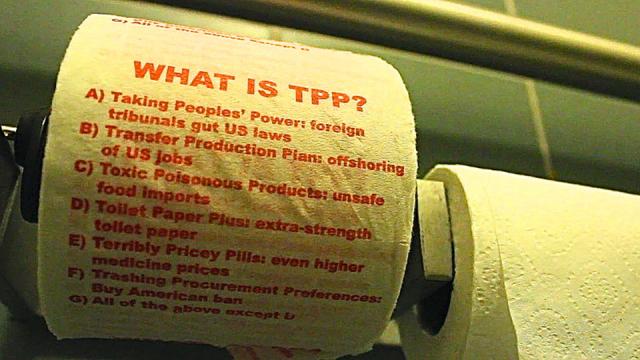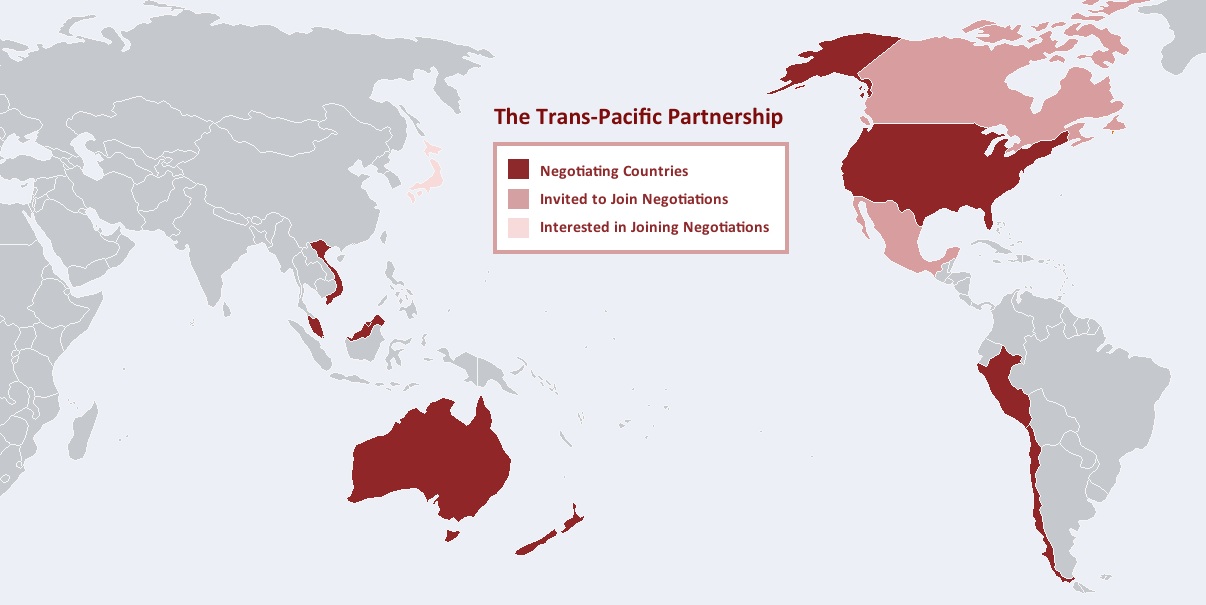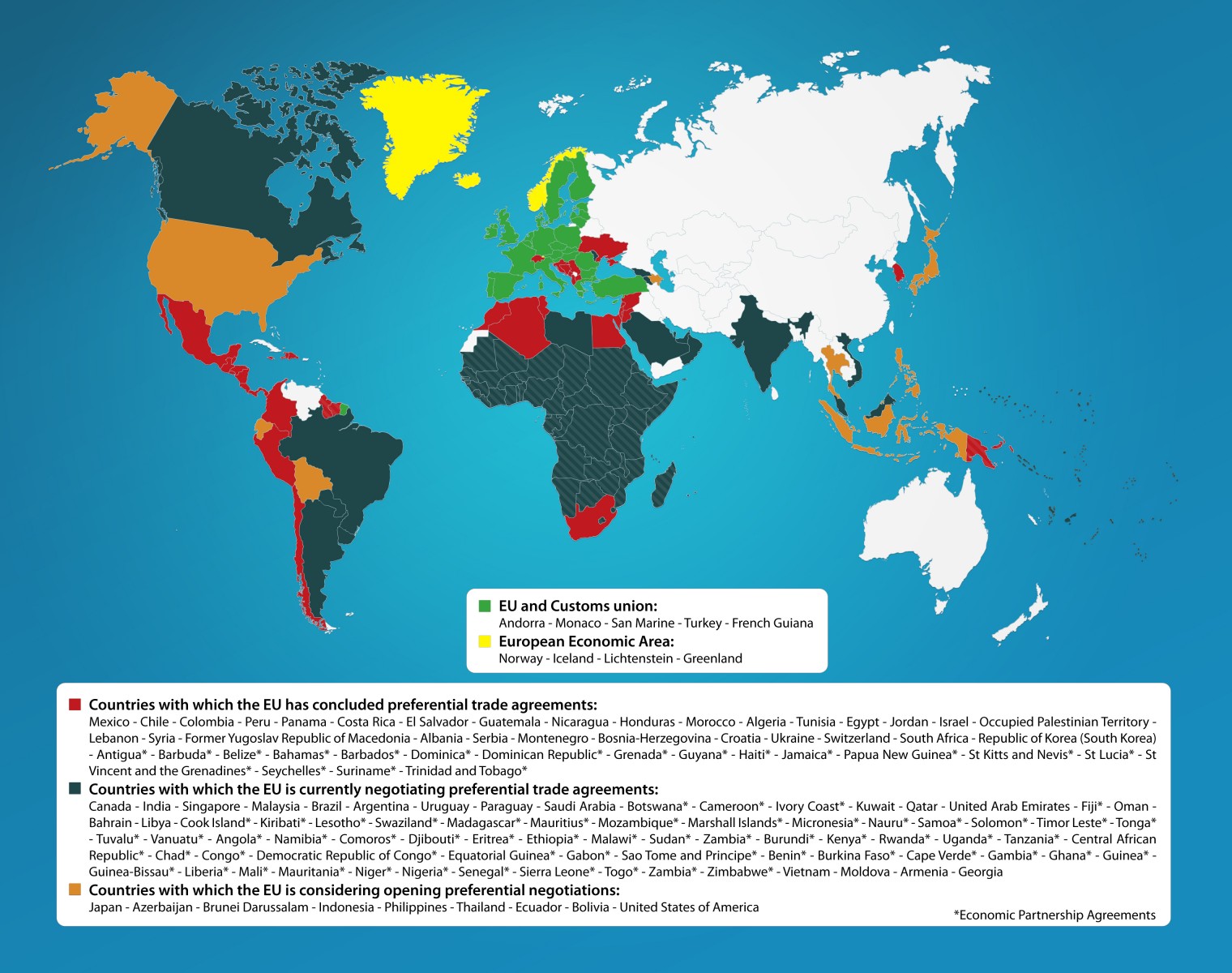
It’s a sign of the times that a reputable economist, Dean Baker, can use the word “corruption” in the headline of an article describing two major trade deals under negotiation and no one bats an eye.
By way of background, the Administration is taking the unusual step of trying to negotiate two major trade deals in the same timeframe. Apparently Obama wants to make sure his corporate masters get as many goodies as possible before he leaves office. The Trans-Pacific Partnership and the U.S.-European Union “Free Trade” Agreement are both inaccurately depicted as being helpful to ordinary Americans by virtue of liberalizing trade.
Instead, the have perilous little to do with trade. They are both intended to make the world more lucrative for major corporations by weakening regulations and by strengthening intellectual property laws. The TPP has an additional wrinkle of being an “everybody but China” deal, intended to strengthen ties among nations who will then be presumed allies of America in its efforts to contain China. As we indicated via a link to an Asia Times article over the weekend, that’s proving to be a bit fraught as Japan is flexing its muscles militarily and thus less inclined to follow U.S. directives tamely.
One of the most disturbing aspects of both negotiations is that they are being held in secret - secret, that is, if you are anybody other that a big U.S. multinational who has a stake in the outcome.
Baker describes in scathing terms why these types of deals are bad policy:
"…these deals are about securing regulatory gains for major corporate interests. In some cases, such as increased patent and copyright protection, these deals are 180 degrees at odds with free trade. They are about increasing protectionist barriers. "All the arguments that trade economists make against tariffs and quotas apply to patent and copyright protection. The main difference is the order of magnitude. Tariffs and quotas might raise the price of various items by 20 or 30 percent. By contrast, patent and copyright protection is likely to raise the price of protected items 2,000 percent or even 20,000 percent above the free market price. Drugs that would sell for a few dollars per prescription in a free market would sell for hundreds or even thousands of dollars when the government gives a drug company a patent monopoly… "The idea is that once a deal is completed there will be enormous political pressure for Congress to approve it no matter what it contains….news outlets like the Washington Post will use both their news and opinion sections to bash members of Congress who oppose a deal. They will be endlessly portrayed as ignorant Neanderthals who do not understand economics. "The reality of course is that it is the 'free traders' who either do not understand economics or deliberately choose to ignore it. Many of the provisions that we are likely to see in these deals, like stronger patent protections, will slow growth and cost jobs. "These deals will also lead to more upward redistribution of income. The more money that people in the developing world pay to Pfizer for drugs and Microsoft for software, the less money they will pay for the products that we export, as opposed to 'intellectual property rights'…. "This is yet another case where the government is working for a tiny elite against the interests of the bulk of the population."
If that isn’t bad enough, there’s another side of these planned pacts that is often simply ignored. These “trade” deals are Trojan horses to erode or eliminate national regulations. Baker anticipates that these deals will include sections that would limit government regulation (including at the state and local level) on fracking and could revive much of the internet surveillance that reared its ugly head in the failed SOPA.
And this sort of erosion of the right to regulate will most assuredly extend to financial services. Dodd Frank? The Brown-Vitter bill that some see as a great new hope for tougher financial regulation? They are already unworkable under existing trade agreements. As Public Citizen noted:
"One of the most controversial WTO agreements is the General Agreement on Trade in Services (GATS)..One of the most controversial service sectors covered by the GATS is finance… "Taken as a whole, the WTO’s limits on financial service sector regulation are expansive. These rules not only guarantee foreign financial firms and their products access to U.S. markets, but also include numerous additional rules that limit how our domestic governments may regulate foreign firms operating here: "No new regulation: The United States agreed to a “standstill provision” which requires that we not create new regulations (or reverse liberalization) for the list of financial services bound to comply with WTO rules. Translated out of GATSese, this means that the United States has bound itself not to do what Congress, regulators and scholars deem necessary – create new financial service regulations. "Certain forms of regulation banned outright: The United States agreed that it would not set limits on the size of financial firms, the types of financial service one entity may provide or the types of legal entities through which a financial service may be provided in the broad array of financial services signed up to the WTO. These WTO rules conflict with countries’ efforts to put size limitations on banks (so that they do not become “too big too fail”) and to “firewall” different financial services (a policy tool used to limit the spread of risk across sectors). "Treating foreign and domestic firms alike is not sufficient: The GATS Market Access limits on U.S. domestic regulation apply in absolute terms. In other words, even if a policy applies to domestic and foreign firms alike, if it goes beyond what WTO rules permit, it is forbidden. And, forms of regulation not outright banned by these rules must not inadvertently “modify the conditions of competition in favor of services or service suppliers” of the United States, even if they apply identically to foreign and domestic firms. Might aspects of the Wall Street bailout eventually “change the conditions of competition” in favor of U.S. firms? Other WTO members have begun reviewing just this question. "No bans on new financial service “products”: The United States is also required to allow all foreign financial firms operating here “to offer in its territory any new financial service,” a conflict with proposals to limit various risky investment instruments, such as types of derivatives. "Other non-discriminatory domestic regulations also subject to review: GATS subjects policies of general application that may affect service sector firms to review, with WTO tribunals empowered to determine if they are “reasonable”, whether they “could not reasonably have been expected” and whether licensing and qualification requirements and technical standards limit foreign firms’ access."
And the TPP would tilt the table even further in favor of financial firms. Public Citizen again:
"The draft text of the Trans-Pacific Partnership (TPP), a NAFTA-style FTA under negotiation between the United States and 10 Pacific Rim countries, contains the same limits on financial regulation as the WTO, and more. In addition, these rules would be privately enforceable by foreign financial firms that could “sue” the U.S. government in foreign tribunals, which would be empowered to order payment of unlimited sums of U.S. taxpayer money if they saw our laws as undermining such firms’ “expected profits.”' "Also, even as the International Monetary Fund has officially shifted from opposition to qualified endorsement of capital controls, which are used to avoid destabilizing floods of speculative money into and out of countries, the TPP would ban the use of these important regulatory tools. Despite years of pressure from former House Financial Services Committee Chair Rep. Barney Frank to permit capital controls, the Obama administration is the strongest promoter of this ban in the TPP."
When we have to look to Barney Frank as a lonely defender of the public’s interest, you know you’ve gone past an event horizon. The very fact that trade negotiations, which are normally so sophorific that they remain out of the public’s mind, are being held in secret says that what is afoot is most decidedly not in the average person’s best interest. At a minimum, voters and the press need to demand that these talks be conducted in the open to prevent Congress from being presented with a fait accompli.
The one good bit of news is Obama is looking more and more like a lame duck every day and his overplaying his hand on these bills could well backfire. But the stakes are sufficiently high that relying on nature to take its course is risky, particularly since corporate lobbying dollars will buy a lot of Congressional complacency. So make noise early and often about this outrage, particularly with local media outlets.
3 WAYS TO SHOW YOUR SUPPORT
- Log in to post comments
















